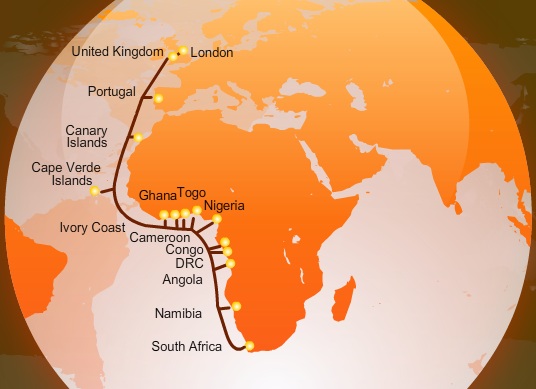West Africa Cable System (WACS) technically goes live, benefits soon to follow
Millions of Africans are one step closer to being connected to the global Internet following the May 11th launch of the 14,000km long West Africa Cable System (WACS) in Cape Town, South Africa. Consumers likely won’t see immediate benefits from the cable, but its operation is a landmark event in the chronicles of African connectivity.
It’s as though we are no longer penned in.” – Wessel van der Vyver, managing director for international services at Telecom Namibia
It will be capable of carrying the equivalent traffic of Seacom, Eassy and SAT-3/WASC/SAFE cable systems combined. Wacs will meet the demand for capacity well into the first quarter of the 21st century.” – Neotel CTO and co-chairman of the Wacs management committee, Angus Hay
It’s unclear exactly if any ISPs are immediately utilizing the new capacity, but the launch is over three years (and US$650 million) in the making. Activation of the cable comes over a year since the cable first landed in South Africa. WACS is also the first direct submarine cable to link Europe, West Africa, and South Africa in over ten years. Political stability and economic planning have certainly come a long way since the SAT-3 cable last connected many West African nations, but what does WACS bring to Africa’s broadband environment?
Perhaps little in the next few months, but great things in the next couple of years:
- 500 Gb/s initial capacity upgradable to 5.12 Tb/s – the most of any undersea cable landing in Africa to date. Which is actually too much capacity for coastal areas with direct access. Infrastructure providers will hopefully rush to bring capacity inland, however.
- In most of the nations served by the WACS cable, mobile broadband will become a reality. 4G and LTE will truly be possible. Still, as Vodacom CTO Andries Delport reminds us, “international connectivity is actually a pretty small part of the overall cost of delivering a megabyte of data via mobile.”
- Nations like Namibia, Angola, DRC, Congo, and Togo will have direct international access for the first time. Soon these countries will be able to sell extra capacity to neighboring nations.
- Open access policy will boost international broadband competition which will benefit the consumer. For example, smaller operators in large markets like Nigeria can acquire direct capacity instead of securing it through larger operators.
- South Africa’s government, as a pioneering partner on WACS through Broadband Infraco, can hopefully fulfill a 2020 vision of broadband for all.
- Reduced broadband delivery costs: TEAMs and EASSy have partially contributed to 50% lower costs in parts of East Africa.
- In the long term: lower prices will mean greater local content to address poverty and unemployment. Improved e-agriculture, e-commerce, e-learning, m-banking, and m-health will result indirectly from WACS.
- Challenges remain around terrestrial connectivity, competition in respective markets, and wholesale pricing and consumer access.
- Also, political roadblocks exist in at least the Democratic Republic of the Congo. Although the DRC’s link to Monhoul Beach, the nation’s landing station for WACS, could be completed in less than two months it appears unlikely that the project will receive the go-ahead anytime soon.
When do you expect to see benefits from WACS? We’d be curious to know of any traceroutes that prove WACS operation in any of the respective countries.
WACS is operated by a consortium of 14 companies: Angola Cables, Broadband Infraco, Cable & Wireless, Congo Telecom, MTN, Office Congolais des Postes et Télécommunications, Portugal Telecom/Cabo Verde Telecom, Neotel, Telecom Namibia, Internet Solutions (IS), Telkom SA, Togo Telecom and Vodacom. The cable has landing stations in Namibia, Angola, the Democratic Republic of Congo, the Republic of Congo, Cameroon, Nigeria, Togo, Ghana, Côte d’Ivoire, Cape Verde, the Canary Islands, Portugal and the United Kingdom.













 Twitter
Twitter Facebook
Facebook Pinterest
Pinterest
[…] overcoming the barriers to accessing health research. Just a couple of weeks ago, we heard that “millions of Africans are one step closer to being connected to the global Internet” through the launch of the West African Cable System. But being one step closer certainly […]
[…] overcoming the barriers to accessing health research. Just a couple of weeks ago, we heard that “millions of Africans are one step closer to being connected to the global Internet” through the launch of the West African Cable System. But being one step closer certainly […]
[…] will provide the kind of Internet access that other countries have long enjoyed. This May, the West Africa Cable System (WACS) went live, running from the United Kingdom to South Africa and providing some ten African […]